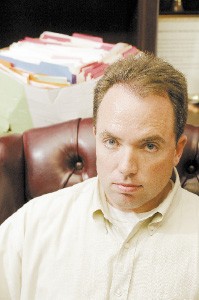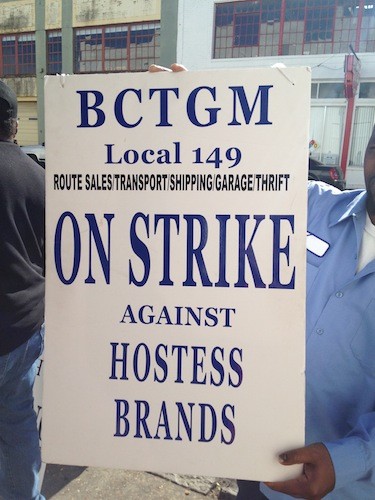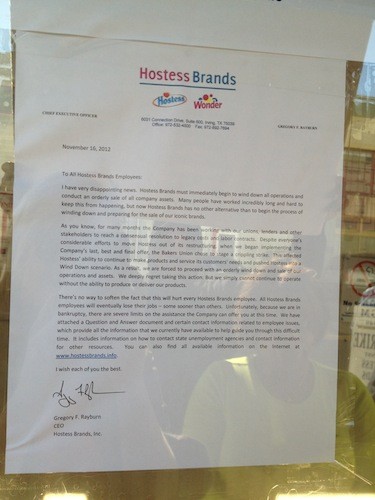“I work all night, I work all day, to pay the bills I have to pay / Ain’t it sad / And still there never seems to be a single penny left for me / That’s too bad.” — ABBA
Leaning back against the glass window at a Starbucks in Cordova, Leigh blends in with the crowd. She has the sweet, maternal appearance of a soccer mom. One might pass her at the grocery store and assume she lives the American Dream with a couple of kids, a well-paid husband, a swimming pool, and a golden retriever in the backyard.
But in reality, Leigh (who asked the Flyer not to reveal her real name) isn’t swimming in crystal-clear, chlorine-sanitized pool water. She’s swimming in a sea of debt.
After divorcing her husband four years ago, Leigh was stuck paying off most of the couple’s debt on her own, since their credit cards were in her name.

“When we separated, he paid for some of them, but when [the divorce] was official, he said, ‘They’re yours again,'” says Leigh. “We didn’t argue in court because we don’t have any children, so I got stuck with the credit-card bills. I can’t prove that my husband used them.”
At first, it didn’t seem so unmanageable. She was paying on the bills every month. She managed to pay off her car, an eight-year-old Dodge Neon. But she was saving the large bills for last, and on her salary, she wasn’t able to pay rent, utilities, living expenses, school-loan payments, and the credit-card companies. So she focused on keeping a roof over her head, meaning some credit-card companies didn’t get paid. That’s when the calls started coming.
“One company didn’t even contact me,” says Leigh. “A sheriff just showed up at my door at 7:30 in the morning with a summons to court. They said they were suing. I didn’t even realize that debt was still out there.”
After being constantly harassed by credit-card companies, Leigh decided she’d look into filing bankruptcy. Unfortunately for her, that decision came about a year too late. She finally called an attorney a few weeks before October 17th, the one-year anniversary of the Bankruptcy Abuse Prevention and Consumer Protection Act of 2005. She learned that, due to a new provision in the act, it would be difficult and costly for her to obtain relief under Chapter 7, the type of bankruptcy in which the debtors liquidate all their assets and forgo further monthly payments.
Though the act was passed in an attempt to cut back on what Congress considered abuse of bankruptcy filings, judges, attorneys, and trustees say the act has done more to affect filings by the working poor than by high-rolling CEOs.
Here in Memphis, once labeled the bankruptcy capital of the nation, filings dropped precipitously after the act went into effect last October. Though the number of filings has risen steadily since, filings are still about half what they once were. In September 2004, there were 2,189 bankruptcy cases filed in Memphis. In September 2005, 2,811 cases were filed. In September 2006, only 1,297 cases were filed.
The consensus among local bankruptcy officials is that the act didn’t fix the underlying problems that cause bankruptcy. It just made the process more burdensome and costly.
Robbing Peter, Paying Paul
After paying her rent, utilities, and living expenses, Leigh only has about $32 a month left over. That isn’t nearly enough to make the required monthly payments in a Chapter 13 plan, which allows the debtor to pay off bills under a court-approved repayment plan rather than by surrendering personal property.
But due to a new provision in the 2005 bill, Leigh doesn’t qualify for Chapter 7 either. She failed the means test or, as debtor’s attorney Tom Fila calls it, the “mean test.” The new statutory test uses a mathematical formula to compare one’s income and living expenses with the state median income of $34,151. Using those numbers, people who make a certain amount higher than the state median are forced to file Chapter 13 instead of Chapter 7 if they want relief under the bankruptcy code.
“They look at your gross income, not what you actually bring home after taxes,” says Leigh. “I try to do everything right. I work and try to pay bills. I don’t have much. I drive an eight-year-old car that breaks down all the time.”
If Leigh were jobless, she’d be able to file Chapter 7, but since she’s stuck somewhere in the middle, she’s being forced into Chapter 13. The bill was designed to crack down on abusive filers, yet people like Leigh are the ones getting the short end of the stick.
Abusive filings are actually pretty rare in Memphis. Local bankruptcy trustee George Stevenson, who handles payment in all Chapter 13 cases filed in Memphis, says he’s only seen a handful of abusive cases in the 24 years he’s served at the bankruptcy court.
“I’ve participated in three criminal trials [regarding abuse],” says Stevenson. “We’ve referred more cases to the justice system, but they never went to trial, so apparently they didn’t rise to the level of crimes.”
After a multimillion-dollar lobbying campaign by the credit industry, the new bankruptcy act was passed, with 70 percent of Congress voting for it. Among those voting “yes” was 9th District representative Harold Ford Jr.
The new bankruptcy act is 500 pages long and, according to several bankruptcy officials, difficult to decipher.
“Unmistakably, the creditor-friendly 2005 bankruptcy act … is not a model of clarity,” says David S. Kennedy, chief U.S. bankruptcy judge for the Western District of Tennessee. “There’s little underlying legislative history to provide the judiciary with much guidance regarding congressional intent.”
The new law made numerous changes to the old bankruptcy system, but in a nutshell, it does the following: increases filing and attorney fees, requires more paperwork, requires filers to pay for and attend credit-counseling services, and establishes the aforementioned means test, which makes filing Chapter 7 more difficult.
 Justin Fox Burks
Justin Fox Burks
Bankruptcy Central: 200 Jefferson in downtown Memphis
Though Leigh’s situation is common in much of the country, it’s not so common in Memphis, where the majority of those wishing to file Chapter 7 fall well below the state median income.
“Usually, everyone who does the means test has a lower income,” says Jack Hogan with the local Consumer Credit Counseling office. “[The new law] is in place to collect some of the high-end bankruptcies, which, of course, in Memphis we don’t really see. It’s mainly the average Joe filing here.”
But no matter what kind of bankruptcy the average Joe chooses to file, the cost of filing is affecting everyone. Filing fees have gone up and so have attorney’s fees. Since the paperwork is more difficult now, it’s nearly impossible to file without an attorney’s expertise.
“There’s no doubt bankruptcy is more expensive than it was before,” says Kennedy. “Lawyers are required to prepare more documents. There’s a lot more due diligence. But a lot of folks can’t afford to hire a lawyer, and they’re too unsophisticated to represent themselves. There’s so many more legal hoops to jump through.”
According to attorney Ben Sissman, who represents both creditors and debtors, his attorney fees rose from $800 to $900 before October 17, 2005, to around $1,375 now.
And debtors must now attend credit-counseling services — before filing and prior to being discharged from their bankruptcy. Though they can be waived in certain circumstances, there is a charge for both classes.
“Some of the information they’re getting from credit counseling is beneficial, but sometimes it’s inane stuff,” says Fila. “They’re telling people to get more money, get a better-paying job. Thanks a lot, genius. If only I would have thought of that myself.”
Fila says there’s a misconception that people filing bankruptcy don’t know how to manage their money.

Tom Fila
“It’s easy to manage your money when you have money. But when your utility bill comes in and you don’t have the money and you’ve got four kids and the car payment’s due next month, you’ve got to start juggling,” says Fila. “They’re robbing Peter to pay Paul, yet they keep their lights on. The kids get fed. They’ve stretched the dollar so thin the thing is squealing. They should be teaching classes on managing money.”
No Ken Lays Here
Ramona Burrow, a red-headed woman who appears to be in her mid-to-late 40s, raises her right hand and takes an oath to tell the whole truth, then sits in a cushioned chair facing Chapter 13 trustee staff attorney Chantele McIntyre.
Burrow and her attorney are at the Meeting of Creditors, a mandatory meeting where Chapter 13 debtors and their attorneys go over their repayment plans with the trustee’s staff. At least 50 debtors are gathered today, occupying several rows of chairs at the back of the room.
They’re white, black, young, old, dressed up, dressed down. The crowd could easily be the same people one might see dining at IHOP after church on Sunday. Each debtor waits patiently for his or her name to be called, at which time they’ll sit across from McIntyre and go over their individual repayment plans.
Burrow sits quietly while McIntyre goes over her plan, listing how much she’s required to pay on each debt she owes. After reviewing the plan, McIntyre shoots off a number of questions so quickly she could be mistaken for an auctioneer:
“Did you list everybody you owe?”
“Do you own a home? Whose name is on the deed?”
“Do you have a car in your name?”
“Do you have any lawsuits pending?”
“Do you have a right to sue anybody?”
“Do you have child support or alimony?”
After answering “no” to most of the above questions, Burrow reveals that she’s a full-time college student. Her husband brings home $1,950 a month. The whole process takes less than 10 minutes, and Burrow leaves with a repayment plan established in her Chapter 13 case.
Thanks to the new bill, this room hasn’t been quite as full this year as it has been in years past. But the number of filers is inching back up. In fact, since fewer people are able to file Chapter 7 now, more and more people are finding themselves at the Chapter 13 Meeting of Creditors.
In the first nine months of 2005, before the bankruptcy bill was signed into law, 63 percent of Memphis bankruptcy cases were filed as Chapter 13. In the first nine months of this year, 79 percent of the cases filed were Chapter 13.
From January to September 2005, 20,291 cases were filed in both Chapter 7 and 13. Compare that with 10,338 from January to September of this year.
Numbers dropped dramatically after October 17, 2005. In Memphis, over 500 cases were filed on October 16, 2005, and over 1,000 were filed on October 14th. That was up from the average of 50 cases on a normal day.
“October 17th was kind of a watershed day. After that, [filing] dropped dramatically,” says Fila. “A lady came and told me she didn’t even know she could still file. She thought George Bush had canceled bankruptcy. The media made it out as ‘You need to file now or you’re not going to have the opportunity.’ So everybody and their mother filed right before October 17th. Now the numbers are going right back up.”
Though the new bill may be weeding out a few people who have simply charged too much on their credit cards, many Memphians are filing for more serious reasons.
“Historically, people file here because they’ve lost their job or they’ve gotten divorced or they’ve gotten hurt and can’t pay their medical bills,” says Jennie Latta, U.S. bankruptcy judge for the Western District of Tennessee. “And all those problems can go hand in hand. When you’ve got money troubles, that often leads to domestic troubles. Or domestic troubles can distract you and make you a less effective worker.”
Latta says these typically aren’t people unwilling to work. They’re people who are out there trying to find good jobs, but when life comes at them hard, they fall. That’s when they end up in bankruptcy court.

George Stevenson
“Bankruptcy spans race, gender, and age. Black folks are filing. White folks are filing. Poor, young, old,” says Fila. “The only thing that matters here is the color of money. Either you have it or you don’t.”
One of the biggest factors contributing to filings in Memphis is the large number of people working temporary jobs.
“When I started serving as a bankruptcy trustee in 1982, there were two temporary-job services in Memphis,” says Stevenson. “If you look in the Yellow Pages now, you’ll see about 200 temporary-job sources. People can find jobs for a little while, and those jobs end and they’re out of work.”
Sissman tells a story about a woman who worked at the local Cleo Wrap factory, which only offers warehouse employees eight to nine months of work annually. Last winter, the woman was let go a month early due to a lack of work. She was asked to come back a month later than usual the following spring. Those two months were enough to set her back, landing her in bankruptcy court.
“We have a lot of people working very hard in permanent part-time jobs,” says Sissman. “The people who wrote this bill have never met anyone like that. They have no clue that everybody who lives in America doesn’t have an accountant and a bookkeeper and all the stuff people in government take for granted because they can afford whatever they want.”
It doesn’t hurt that the stigma attached to filing bankruptcy has waned over the years.
“Some of the stigma has gone away because people see the movie stars and politicians filing,” says Fila. “But people still hate doing it. They’d rather be anywhere else than sitting across from me. They cry. They’re upset. They’re glad to get relief, but nobody’s happy about coming in here.”
Deep Roots
Chapter 13 has deep roots in Memphis. It was created in 1938 by Walter Chandler, a former U.S. representative and former mayor of Memphis (also the father of former Mayor Wyeth Chandler).
Chapter 13 is generally favored by credit-card companies, auto lenders, and other creditors because the repayment plan ensures they’re getting at least some of their money back. That’s unlike Chapter 7, in which creditors are only paid by assets the debtor is able to sell off. When assets run out in Chapter 7, the remaining debts are usually discharged.
The new bill was designed to push more people into filing Chapter 13, yet the majority of filings in Memphis were Chapter 13 anyway.
“The new bill really had much less of an effect on Memphis than it did the rest of the country,” says Stevenson. “It wasn’t like, ‘You’re doing things wrong in Memphis. We want to change you.’ It was, ‘You’re doing things wrong in other parts of the country. We want you to do it more like it’s done in Memphis.'”
Yet the bill still makes it more difficult for those filing Chapter 13. Not only is the process more costly for Chapter 13 debtors, the bill attempts to cut back on serial filings by making it harder to get an automatic stay after re-filing. An automatic stay is legal jargon for a hold put into place after a person files, making it illegal for creditors to harass debtors for payment.
The Early Bird Gets Good Credit
It’s 8 a.m. on a summer Saturday, yet about 35 kids, mostly junior high or high school students, are piled into a North Memphis police substation for a little Finances 101.
The station is hosting a financial-planning workshop for teens. Managing credit isn’t taught in city schools, so officers have invited a couple of bankers, an automobile finance manager, and an apartment manager to speak to the kids about how to manage their money.
“Are you already getting credit-card applications in the mail?” asks Brenda Harper from Regions Bank. No one raises a hand, but Harper looks skeptical. “Well, you’re all getting ready for college, and you’ll soon be bombarded.”
As Harper goes over the ins and outs of credit scoring, bank accounts, and how to write a check, several kids take notes. She goes over the types of bankruptcy and tells them “it should always be a last resort.”
People like Harper and officer Dennis Manning (who’s leading the session) are hoping to nip the bankruptcy problem in the bud so, new bill or not, it won’t become an issue these kids have to face.
According to a 2005 Nellie Mae report, 76 percent of college undergrads have a credit card, but only 21 percent of students pay their cards off in full each month. The average student balance is $2,169, and 25 percent of students with cards owe $3,000 or more.
“You get credit-card applications when you buy your school books for college,” says Fila. “What kind of message does that send? They want to hook these kids in early. They know they’ll graduate and get high-paying jobs.”
Some of those college kids may end up filing bankruptcy. That’s why Kelly Rousseau of the bankruptcy court started C.A.R.E. (Credit Abuse Resistance Education) in Memphis earlier this year. The program goes into local high schools to teach kids financial literacy.
So far, Rousseau has taken the program to the Memphis Grizzlies Academy, Lausanne Collegiate School, Houston High School, and Millington High School. She says she hopes to get the program into city schools by next year.
“We’re teaching kids the difference between needs and wants. They need to know if they buy something with a credit card, they need to pay it off when the bill comes in,” says Rousseau. “Having a card for true emergencies is okay. It’s a good way to establish credit, but it depends on how responsible they can be.”
In a perfect world, financial planning would be a part of every high school curriculum. But this is not a perfect world. For the foreseeable future anyway, Memphis will continue to have debtors who turn to bankruptcy as their only way out. They’ll just have a harder time trying to do so.
“The law changed a lot, but it didn’t change the economics of the situation,” says Fila. “People are still broke. They’re still struggling. They still have car notes, and the debt and financial pressure is still out there. But now the outlet’s been restricted.”



 Justin Fox Burks
Justin Fox Burks 
